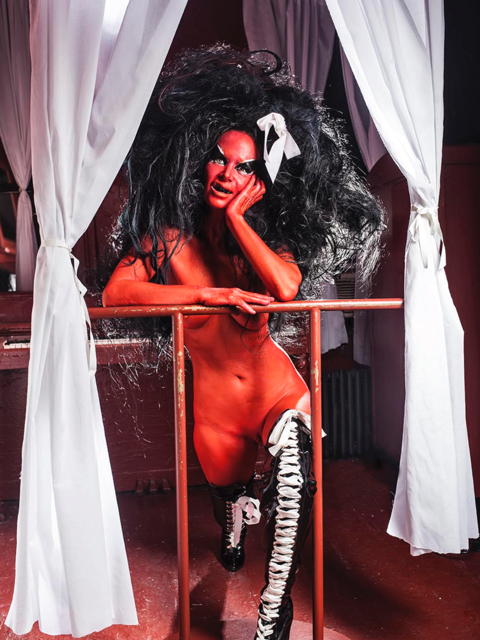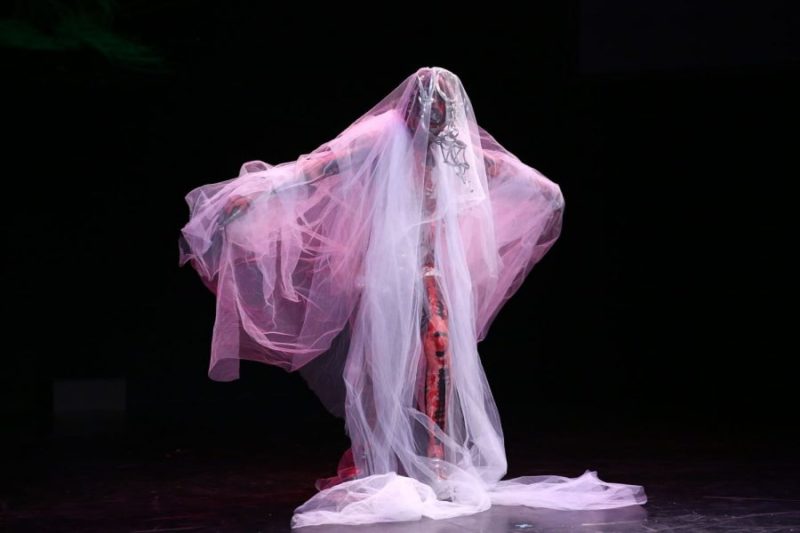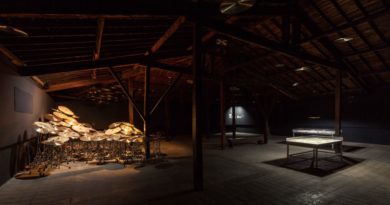On a sinking ship penetrated by patriarchy, what do you “choose” to do?: Future Feminism with Johanna Constantine
Interview by Ekin Sanaç
Our world, which is now defined by militarized borders and a collapsed ecology, is in a dreadful and extremely complex crisis situation. Gender equity remains unresolved since time immemorial, and possibly we are all well-aware that a “sustainable future” may as well be all we have time for. The remaining days for the planet to end up unlivable and run-down for most species, humans included, is now maybe what, only a couple decades ahead?
That’s why Future Feminism, the art project initiated in 2014 by New York-based artists Kembra Pfahler, Johanna Constantine and Anohni, describes their feminine conscious raising attempt as saving “what remains of our world”. They have embraced “The Future is Female” as one of their 13 Tenets of Future Feminism and thus popularized the slogan.
It’s been a pure pleasure to talk to one of the founders of Future Feminism, a stimulating visual artist and DJ Johanna Constantine, and find more out about her personal history, her collaborations with Anohni since they were teenagers and the grounds of their project.

What was your initial motivation to go on stage in the first place, in the earliest years? Why did you first start to perform?
As a young adult I was coming out of the California punk rock scene. At that time in America, this meant you were essentially cutting yourself off from any viable career opportunities or support from mainstream society. To be willing to make this sacrifice was a huge statement of protest in itself as to what was going on around you. Anohni and I met during this period, and started performing together immediately. I figured my application was “artist”. It never occurred to me to enter any type of training or look for institutional support. We started with whatever stage we were presented, garbage to build with and a microphone. Just one person to support and believe in you is all that is really necessary. The rest can be learned as you go along!
“My thought process in my personal practice of feminism has changed radically over the years.”
The power and influence of the concept of role-model(s), especially when younger, can be massive. Who were the earliest role-models/figures/thoughts that first inspired you to identify as a feminist? Do you consider younger generation of today to be luckier in this sense?
Coming of age in the 80’s, I was actually desperate for role models. I looked around me and saw nothing that I wanted. There was this heavy female beauty aesthetic that all seemed to revolve around the desires of men. I felt angry and cut off. I could see no future that I could live with. I adapted an extreme and very off putting appearance, looking to attract community. This was pre-internet so you really had to “fly the flag”. This did lead me to strong groups of politically like-minded friends, but I struggle to find something to “aspire” to.
I had a concept of the type of woman I wanted to become. As a pre-teen I had found one female heroine to emulate. That was Grace Jones! I had a poster of her in her “Conan the Barbarian” costume brandishing her spear in the center of my bedroom wall. I rode my bicycle to the local gym every day. I pumped iron with a room full of sweaty hulking men. We never spoke. I became very strong. It was a huge asset growing up in Northern California, as I did have some attacks to repel.
The moment things really turned a corner for me was reading an interview with the singer Diamanda Galás in the book Angry Women. It was the most extreme, amazing diatribe of rage against misogyny. And people were listening! It was printed in a book! She described becoming an artist. She charted it out for me. It was something she decide to become, so she acquired the skill set she wanted. I thought one just woke up one morning and somehow knew what to do. This was the missing piece I needed to begin my future. It seems so simple, but no one had ever told me this until her!
I do feel young women today are luckier, growing up with such amazing access to information and a global peer group. Though I also see they are laboring under many of the same issues that politicized me. Not only are there most of the same problems, but there is a lot of the same opposition.
Internet culture can be brutal.

“As I became older, I realized, to effect society in a positive way I had to jump into the center of it, not drop out of it.”
Considering your personal history, throughout the years, what have been the major schools of thoughts that haveshifted the way you approach and practice feminism?
My thought process in my personal practice of feminism has changed radically over the years. I talked to Inna Shevchenko (of FEMEN) about this at the Aarhus FF [Future Feminism] program. I said “It seems so strange that I would start out spray painting police stations, and now I sit in circles holding hands with people for the same purpose?” She said, “…and it still burns the same, doesn’t it?” It is so true!
Embracing my dissatisfaction and acting upon it was quite different as a young woman. I expressed my anger in a physical way and rejected the society around me. As I became older, I realized, to effect society in a positive way I had to jump into the center of it, not drop out of it. I try to examine the root causes of behaviors that are so prevalent they are often overlooked, even by those being oppressed. I look to the adversity men face under systems of misogyny as well as woman.
To see a room of women and men gathered to discuss feminist issues is such a strong feeling. I now look to create the broadest community possible.
Were there other movements and practices that inspired how Future Feminism emerged, especially in terms of getting organized, discussion mechanisms, embracing shifts and changes? Were there any specific models that inspired you, or did the whole process move rather instinctively?
The model for our discussions grew very organically. We arranged a date to meet and talk about specific women’s issues together as artists. We realized within our social circles none of us had a comfortable place to discuss anything falling under the banner of “feminism”. It seemed almost like a dirty word. We tried to figure out why. We looked it up in the dictionary. We decided it was the correct and best word to use and wanted to place it in front of our community again with an art project. We began to have weekly meetings about this art project, and soon realized it was a much larger conversation. It didn’t last for weeks, it lasted for years. We took the model of a consciousness raising group. We knew this would be very emotionally taxing, but also very rewarding.
Why did you find the “retreat” method useful when coming up with the Future Feminism manifest?
We realized early on the retreats would be necessary. For us (and for many people I think), taking time to really sit and talk and listen to your friends is actually quite rare. We committed to stopping all other activity for periods of time and just sit together and talk. We brought out all ideas and research and took notes on each of our meeting. We then compared all of our individual view on the discussions, then we would repeat the process. A kind of distilling of ideas. Through many hours and hundreds of pages, we came to a consensus of 13 statements we found most important to the art piece, which became the tenets themselves.


Longevityis a notion that can sometimes be overlooked. Anohni is one of the people you have been collaborating with since you were teenagers. What does it mean to you to be able to pursue this collaboration throughout all the years? What does longevitymean to you?
I look at longevity as a strength of intent. To find something you believe in so strongly you can trace this passion through your life. The work Anohni and I have done together is like a continual thread that can never be broken. I am grateful we met so young. Though to have someone to encourage you that shares your dreams is valuable at any age. You are never too old or too young to have a dream!
What are some of the recent collaborations you are working on these days both as an artist, and a DJ?
I have always worked on two fronts, a visual artists and a DJ. The performances and dance I always presented formally (as was possible) on stages and in museums. The DJing I always did in clubs, though I often created soundscapes for my dances. I recently did a series of live mixing shows for a Butoh festival in Tokyo organized by the Ohno School. It was a great honor! I am still DJing in many clubs, but have begun to combine the live music and dance into a band project. It is just me at the moment, but I have already done a few live shows and am looking forward to doing this at Le Guess Who?.
Kembra wrote in her letter to LGW? that “It’s vital to seek one another out in person”. Indeed, sometimes it feels like we are better in supporting one another online and when experiencing hardship, and yet the solidarity is not as strong at other times, for example when showing up at each other’s gigs or shows. What is to blame here?
We can get so busy immersed in our activities. I find myself and my friends will often share a text or comment on a post and feel we are connected. If I look at this honestly, it is actually isolating. To be physically present, be it for your friends or for a cause, is such a stronger feeling. I think digital media is distracting us with so much information, we can forget where true nourishment comes from. I think making the time and really listening to people is the truest form of communication.
In what ways is gender discrimination different than other discrimination people face in terms of how the society at large perceives or discusses it?
I think describing gender discrimination as massively condoned racism is not extreme. It has been so widely practiced (and accepted) for so many years it can become invisible. In examining my own life, there are things I accepted without even questioning. The way I am related to everyday walking down the street. The way I am always vigilant about my safety automatically every day. The way I feel dis-included by my gender in the “rise” of our counties politics and its history. Woman were there, but not there. Women thoughts, in general, weren’t considered important enough in history to be written down. When the term “gender” is mentioned, people often assume you are talking about a body issue. It is so much more than that. Though, very ironically, a woman’s basic right to control her own body is under threat right now in my country.
In Future Feminism, I like to look at the largest possible picture. A global and environmental chain. I also stand willing to fight an old fight a thousand times if that is what is coming.
“If the problems persist, they must continually be addressed by every generation.”
How has your sense of Future Feminism perception among people changed since 2014?
Since the first FF show in 2014, I feel it has developed from an art and performance event to a specific template for discussion. This was my dream. To see our community come together in a space to discuss feminism. We began by organizing nights of performances and presentations around the art piece. We have now began organizing talks and meeting with as many people and projects as we can in any community we are invited to. For me, it is like going back to school. I am learning so much and gathering so many valuable viewpoints. Before any FF event we ask the speakers to please discuss their feeling, not just their platform. We also do not allow argument. We prefer everyone be free to express themselves without having to prepare for a debate or attack. It has been very successful.
Do people give you headache, accusing you of “essentialism” for mentioning the “feminine core values” or “female ways of things”?
Of course we have been criticized for all kinds of things. The tenets were written to be broad and simple and universal. There are old ideas and ideas that came completely new to us. There is so much feminist history. We were not trying to re-write any of it. If the problems persist, they must continually be addressed by every generation. I do personally believe that men and women are different biologically and emotionally, and appreciating this is a pathway to restoring balance.

What is your definition of “breakthrough”?
My breakthrough is empathy.
What is your definition of “failure”?
My failure would be not to try.
What gives you hope these days?
Some say that hope is something that blinds the eyes, I disagree. I look at how quickly things can change, and try to push hard for the positive. I have great hope, because I chose to.
*As part of this year’s LGW?, the group will put on a theatrical performance based around the 13 Tenets of Future Feminism on Friday, and present a Future Feminism discussion as well as a film program.
Made for Le Guess Who? 2018 Program Guide. Printed version available during the festival.



